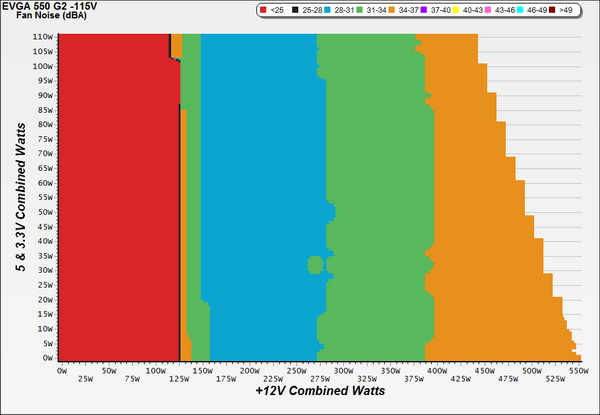EVGA SuperNOVA 550 G2 PSU Review
EVGA introduced two new low-capacity G2 PSUs. Today, we evaluate the 550 G2 model made by Super Flower, which features 80 Plus Gold efficiency.
Why you can trust Tom's Hardware
Efficiency, Temperature And Noise
Efficiency
Our efficiency testing procedure is detailed here.
Using the results from the previous tests, we plotted a chart showing the EVGA 550 G2 efficiency at low loads, and loads from 10 to 110 percent of the PSU's maximum rated capacity.
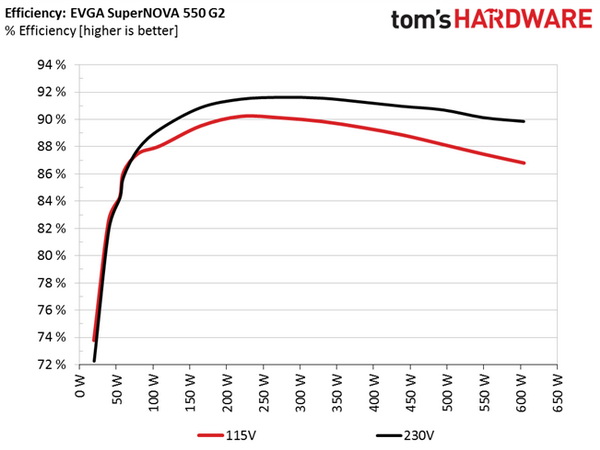
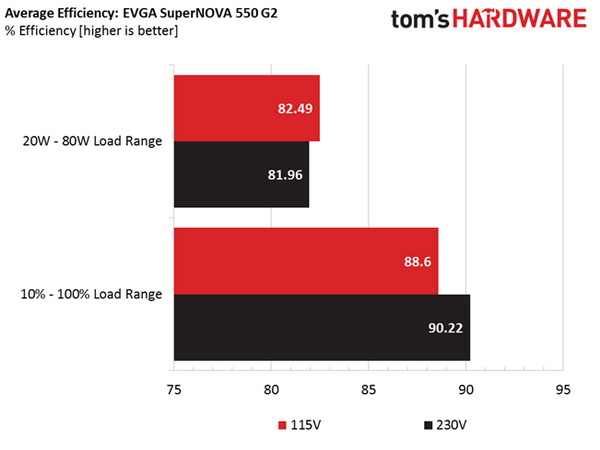
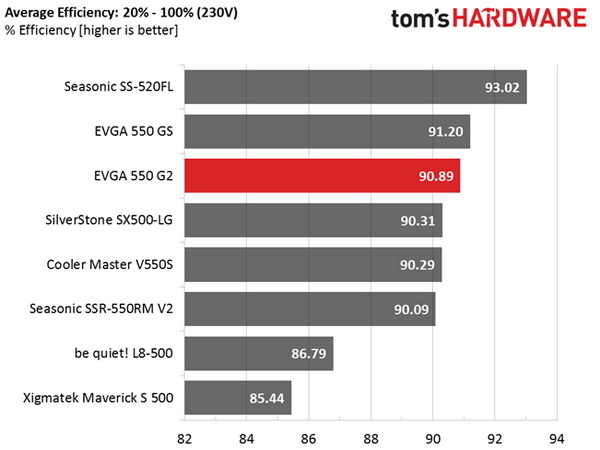
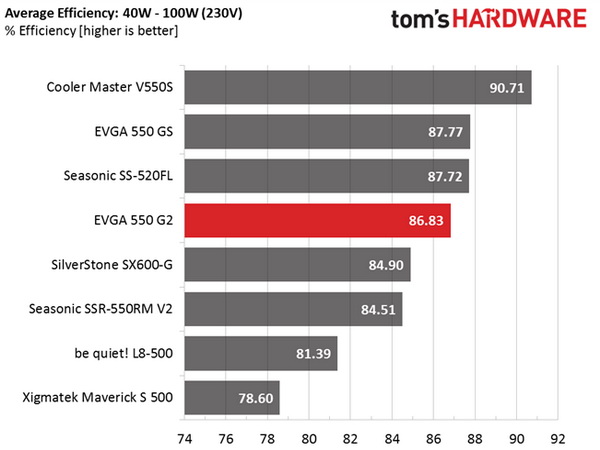
In this comparison, the 550 GS unit wins by a small margin in both low and normal loads. However, the 550 G2 PSU registers very high efficiency levels overall.
Efficiency At Low Loads
In the following tests, we measure the efficiency of the EVGA 550 G2 at loads significantly lower than 10 percent of the device's maximum capacity (the lowest load the 80 Plus standard measures). The loads we dialed were 20, 40, 60 and 80W. This is important for representing when a PC is idle, with power-saving features turned on.
| Test # | 12V | 5V | 3.3V | 5VSB | Power(DC/AC) | Efficiency | Fan Speed | Fan Noise | PF/AC Volts |
|---|---|---|---|---|---|---|---|---|---|
| 1 | 1.186A | 0.491A | 0.480A | 0.194A | 19.60W | 73.77% | 0 RPM | 0 dBA | 0.811 |
| 12.254V | 5.065V | 3.315V | 5.102V | 26.57W | 115.1V | ||||
| 2 | 2.405A | 0.979A | 0.995A | 0.389A | 39.70W | 82.57% | 0 RPM | 0 dBA | 0.904 |
| 12.252V | 5.064V | 3.313V | 5.094V | 48.08W | 115.1V | ||||
| 3 | 3.624A | 1.476A | 1.509A | 0.588A | 59.85W | 86.13% | 0 RPM | 0 dBA | 0.952 |
| 12.250V | 5.062V | 3.311V | 5.084V | 69.49W | 115.1V | ||||
| 4 | 4.834A | 1.974A | 1.993A | 0.785A | 79.77W | 87.51% | 0 RPM | 0 dBA | 0.947 |
| 12.248V | 5.060V | 3.308V | 5.074V | 91.16W | 115.1V |
At low loads, efficiency is very high, and in three of the four tests we conducted, it easily passed the 80-percent mark. In addition, the PSU operated in passive mode throughout these tests, while the ambient temperature inside the hotbox was above 35 C (95 F).
5VSB Efficiency
The ATX specification states that 5VSB standby supply efficiency should be as high as possible, recommending 50 percent or higher efficiency with 100mA of load, 60 percent or higher with 250mA of load and 70 percent or higher with 1A or more of load.
We will take four measurements: one each at 100, 250 and 1000mA, and one with the full load the 5VSB rail can handle.
Get Tom's Hardware's best news and in-depth reviews, straight to your inbox.
| Test # | 5VSB | Power (DC/AC) | Efficiency | PF/AC Volts |
|---|---|---|---|---|
| 1 | 0.101A | 0.52W | 71.23% | 0.108 |
| 5.108V | 0.73W | 115.1V | ||
| 2 | 0.251A | 1.28W | 75.74% | 0.209 |
| 5.103V | 1.69W | 115.1V | ||
| 3 | 1.002A | 5.09W | 78.43% | 0.374 |
| 5.077V | 6.49W | 115.1V | ||
| 4 | 3.001A | 14.90W | 76.61% | 0.466 |
| 4.966V | 19.45W | 115.1V |
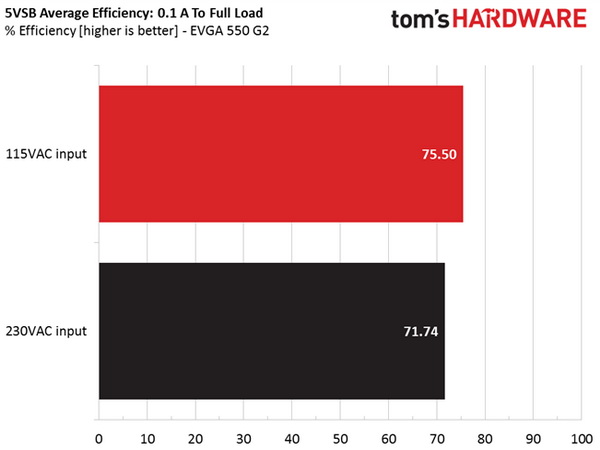
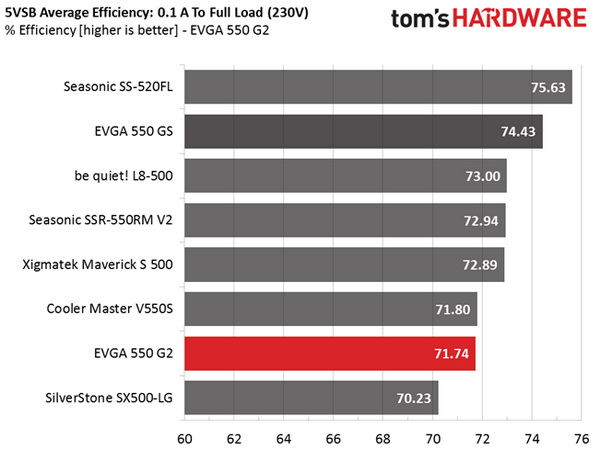
Efficiency on the 5VSB rail was low, especially with the full load. We would like to see efficiency hitting close to, or even above, 80 percent in the last two tests.
Power Consumption In Idle And Standby
| Mode | 12 V | 5 V | 3.3 V | 5VSB | Power (AC) | PF/AC Volts |
|---|---|---|---|---|---|---|
| Idle | 12.267V | 5.068V | 3.316V | 5.111V | 6.23W | 0.534 |
| 115.1V | ||||||
| Standby | 0.10W | 0.016 | ||||
| 115.1V |
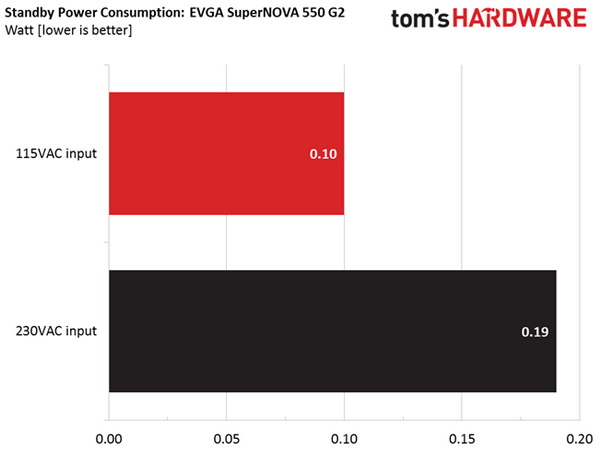
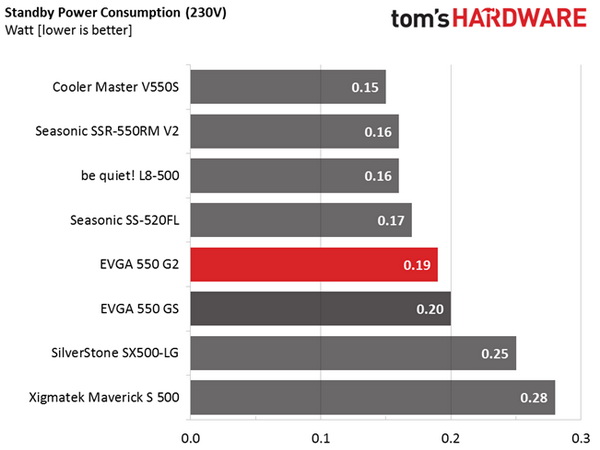
In the table above, you'll find the power consumption and voltage values of all rails (except -12V) when the PSU is idle (powered on, but without any load on its rails) and the power consumption when the PSU is in standby mode (without any load, at 5VSB).
In standby mode, power consumption is at low levels. As expected, with 230 VAC, it is a little higher, but it's still well below the 0.5W that the ErP Lot 6 2013 directive requires.
Fan RPM, Delta Temperature And Output Noise
Our mixed noise testing is described in detail here.
The first chart below illustrates the cooling fan's speed in rotations per minute (RPMs), as well as the delta between input and output temperatures. The results were obtained at 35 to 45 C (95 to 113 F) ambient temperature.
The second chart shows the cooling fan's speed and output noise. We measured acoustics from 1 meter (3 feet) away, inside a small, custom-made anechoic chamber with the internals of the PSU completely covered in sound-proofing material (be quiet! Noise Absorber kit). Background noise inside the anechoic chamber was below 18 dBA during testing, and the results were obtained with the PSU operating at 35 to 45 C ambient temperature.
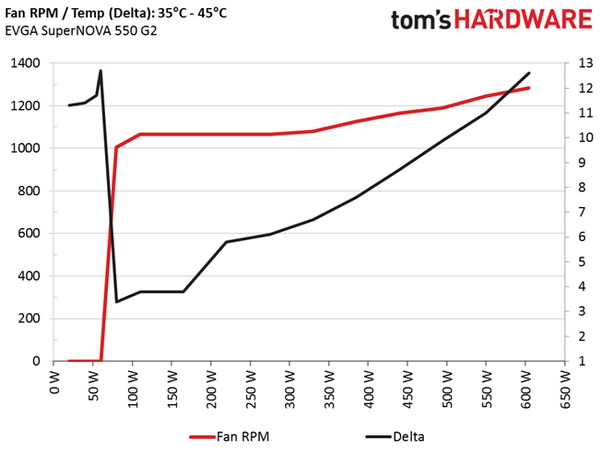
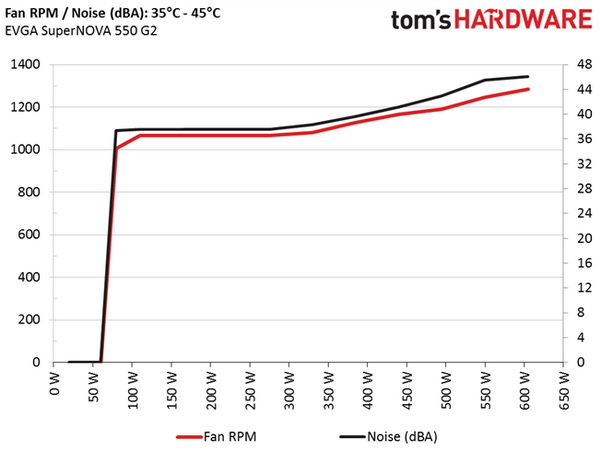
The following chart illustrates the fan's output noise over the entire operating range of the PSU. The same conditions as those for the chart above apply to our measurements, though the ambient temperature was 28 to 30 C (82.4 to 86 F).
The semipassive mode doesn't last very long. However, we think this is good because, that way, sensitive components, like electrolytic capacitors, won't be exposed to tough conditions, which can significantly affect their life spans. After all, this PSU is equipped with a low-speed RPM fan, and in conjunction with the highly relaxed fan profile, even at full loads and normal temperatures, the fan's output noise doesn't exceed 37 dBA. This particular PSU is ideal for users who want to avoid noisy system components.
Current page: Efficiency, Temperature And Noise
Prev Page Load Regulation, Hold-Up Time And Inrush Current Next Page Cross-Load Tests And Infrared Images
Aris Mpitziopoulos is a contributing editor at Tom's Hardware, covering PSUs.
-
marraco Wow. Ripple behavior is fantastic.Reply
I would like to see another test. I had a PC with a Coolermaster PSU and 4 HD which were put to sleep mode/hibernation. Sometimes when the 4 HD were powered up the PC hanged, because the 4 HD demanded so much transient power that it threw the PSU voltages out of specs.
I was thinking that I had a great PSU, but it was expensive garbage. -
Aris_Mp this scenario is covered by the transient response tests, which I conduct in page #7 of the review.Reply -
giantbucket i don't get it... isn't this like trying to sell a Ferrari with only 3 cylinders to appeal to the sub-$100,000 clientele?Reply -
dstarr3 Super Flower makes some great hardware. I'm all over this for my upcoming modest gaming rig.Reply -
dstarr3 Replyi don't get it... isn't this like trying to sell a Ferrari with only 3 cylinders to appeal to the sub-$100,000 clientele?
The problem is that all of the best-built, best-featured PSUs were being made in 850, 1000, 1200, 1600W variants. If you had just a modest system, something mid-range, you either had to get a PSU that was way overkill, or you had to settle for PSUs that weren't so well built, or as efficient, or as fully-featured. So, this is an attempt to distribute very high-quality products to more of the market. And I am 110% A-Okay with that. -
MasterDell Reply
I agree with this to some extent because there are and were tons of PSU's made by Seasonic. Whether they were Antec units or XFX units OEM'd by Seasonic or not.. They were made by Seasonic. Now, as for fully modular, gold rated variants, those were and still are far and few between. However there are tons of Bronze semi-modular/none modular units which are great for mid-range builds.i don't get it... isn't this like trying to sell a Ferrari with only 3 cylinders to appeal to the sub-$100,000 clientele?
The problem is that all of the best-built, best-featured PSUs were being made in 850, 1000, 1200, 1600W variants. If you had just a modest system, something mid-range, you either had to get a PSU that was way overkill, or you had to settle for PSUs that weren't so well built, or as efficient, or as fully-featured. So, this is an attempt to distribute very high-quality products to more of the market. And I am 110% A-Okay with that.
I actually own this unit and used it in a build with a 960. I got it right when it came out and for it's price, it offered a ton. I live in Canada and PSU's are way over-priced and the prices make no sense on them. But this unit was priced extremely well likely due to it's availability so I picked one up. No problems and I am glad EVGA is filling this market void. Good on em.
-
Nuckles_56 Nice to see a low wattage power supply being reviewed for a change and particularly one which performs very wellReply -
turkey3_scratch I think I found my PSU. I don't need any 750W, but I had trouble finding a high quality 550W unit, and this is it!Reply -
g-unit1111 I have two G2s, these are far and away some of the best PSUs on the market! Good to see that EVGA is making some lower wattage models that have the same quality and consistency.Reply
